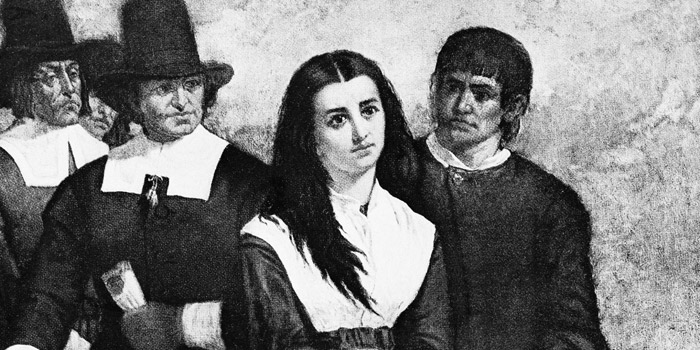
(Creative Commons/Thomas Satterwhite Noble)
A typical witch is a warty, green-skinned lady with a pointed hat, a bent nose, a broomstick and an evil smile. In theology, mythology, film-making and fiction novels, the witch image is exclusively related to an ugly, old woman – an unappealing exterior representing the incarnated evil. But this caricature originates from large-scale witch hunts since the Middle Ages, when women of such looks were sought. Witch hunts are institutional and interpersonal violence against women that were uncommonly strong or smart. From Hypatia to Joan of Arc, and Margaret Thatcher to Hillary Clinton, the witch hunt is a continuing reality as powerful female leaders share the commonalities of being demonized in the public arena.
Joan of Arc, France’s well-known national heroine, was tried for witchcraft by the British after she led the French army to victory during the Hundred Years’ War. She was undermined by the English leadership who credited her successes, tremendous bravery and wit to demonic means or supernatural forces. Of course, according to patriarchal philosophies, a young woman could never perform such wonders on her own. Women are supposedly meek, unadventurous and only knowledgeable within households. The logic follows, anyone who demonstrates capability in politics is suspicious; her strength in leadership has to come from mysterious, supernatural power beyond herself. So, she has to be a witch.
Five centuries later, women in politics continued to face similar charges of bizarre demonization. Compared to male politicians, prominent figures such as Margaret Thatcher and Hillary Clinton faced severe speculation and condemnation publicly. These are witch hunts by definition, but in today’s cultural and political contexts.
The day after former U.K. prime minister Margaret Thatcher passed away, the song “Ding Dong! The Witch Is Dead” suddenly made it to the top song in the U.K. iTunes chart. Calling Thatcher the wicked witch of the country, anti-Thatcher protesters used the satirical lyrics and the underlying metaphor to diabolize Thatcher’s public image. They willfully reinforced the same evil connotation of the term “witch.” Across the Atlantic, former U.S. President Ronald Reagan, who was considered Thatcher’s “political soulmate,” did not face the same level of public rage even with a divided government in D.C. and an ideologically divided public. Beyond her political legacies, Thatcher was prominently controversial due to her uncompromising leadership styles. Indeed, voices from both sides highlighted the dichotomy of gender roles. From her militant way of speech to her approach to leading the U.K. through the Falkland Wars, protesters resented her masculine strength while supporters crowned her as the “Iron Lady.”
Another notable example was Hillary Clinton’s nomination as the Democratic Party’s presidential candidate in 2016. Her high chances of becoming America’s first female president challenged the patriarchal societal norm. Many people criticized her for “unfeminine behaviors.” Protests like #ZombieHillary dramatized her health conditions and advanced age (69 years of age at the time), though neither Donald Trump (70 years of age when elected as the U.S. president) nor Joe Biden (78 years of age when elected) are defined by their elderliness. Clearly, people are not truly concerned about an older president: they are troubled by a female president. Through exaggerations of her voices as “shrill” and “shrieking,” as well as dramatization of her wearing long coats “to camouflage her adult diapers,”, Clinton’s public image was demonized in both representations of her mind and body. In the bigger picture across time, culture and race, witch hunts today continue to target women, especially those that are uncommonly strong or smart.
Recently, we’ve seen feminist solidarity across race, class and gender identity. Recent campaigns like #MeToo and #MakeItCount rallied for gender equality, showing the possibility of collective organization and progression. The successes of Women’s March activities indicate that feminist solidarity holds the potential to make definitive changes and challenge the disempowerment. By understanding the underlying implication for discrimination against “unconventional” power within the “witch” connotation, we should not rebel against the alleged. Rather, if embracing the witch means admitting to having this power, then we should all be witches.
Winci Liang (25C) is from Hong Kong, China.
Winci Liang is from Hong Kong, China, planning to major in Anthropology and Quantitative Sciences. Her interests range from gender dynamics and urban anthropology to data visualization and food culture. She also loves fashion, films, scuba-diving and learning accents of various languages.




